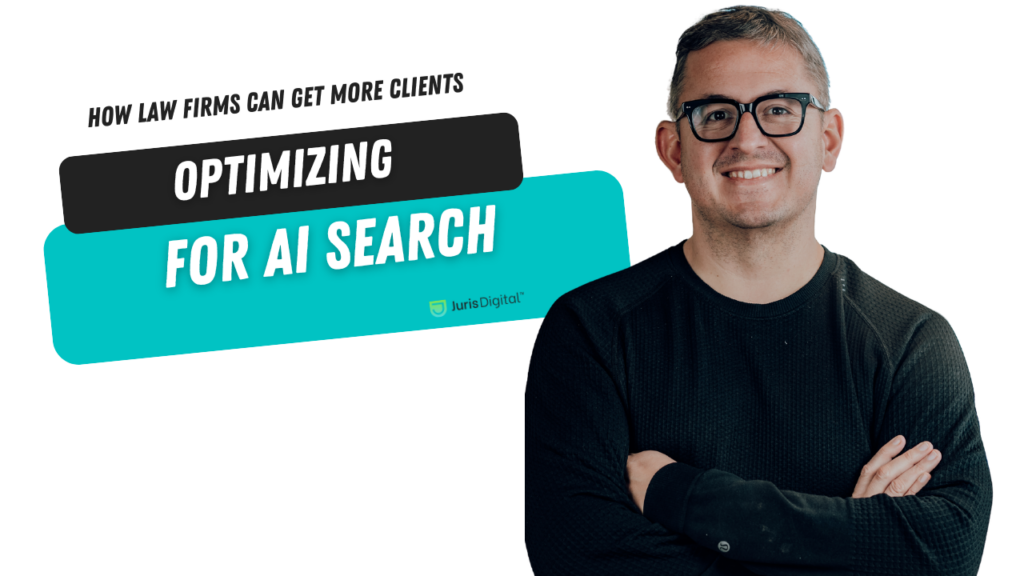For years, I’ve been telling attorneys that if you want to get more cases, you need to be visible where potential clients are searching.
Traditionally, that’s meant ranking in Google’s organic search results, dominating local SEO, and having a strong paid ad presence.
But now, there’s a new player in town: AI-powered search engines and Large Language Models (LLMs) like ChatGPT, Google’s Gemini, Claude, and DeepSeek. And we are starting to see more signed cases originate from these sources.
More and more people are using AI-powered tools to get answers instead of going to Google.
Instead of typing “best personal injury attorney near me” into Google and clicking through results, users are now asking ChatGPT or Bing AI directly.
And guess what? If you’re not showing up in those responses, you’re losing cases to competitors who are.
So, how do you make sure that when someone asks an AI tool, “Who is the best family law attorney in Orlando?” your firm is part of the answer?
Let’s break it down.

How AI Search Works (And Why It’s Different from Google)
First off, you should understand that search engines like Google and AI models like ChatGPT work differently when retrieving and presenting information.
Google crawls websites, indexes content, and ranks pages using an algorithm based on hundreds of ranking factors like backlinks, page speed, and user engagement.
AI models, on the other hand, are trained on massive amounts of text data from across the internet, including websites, books, videos, forums, and even legal case databases.
When someone asks a question, the AI doesn’t just pull up a list of links—it generates an answer based on what it has learned and may cite sources it deems authoritative.
This means that traditional SEO alone isn’t enough. Law firms need to adapt if they want to be part of AI-generated answers. Here’s how.
1. Own Your Online Presence with Structured Data & Clear Branding
AI models rely on well-structured, authoritative content to generate accurate responses. To ensure your law firm is recognized as a reliable source:
- Use Schema Markup: Adding structured data (like
LawFirmandAttorneyschema) to your website helps search engines and AI models understand exactly who you are, what services you offer, and where you’re located. - Consistent Branding Across Platforms: AI models recognize entities (your firm’s name, attorneys’ names, etc.) by cross-referencing multiple sources.
Make sure your name, address, and practice areas are consistent across your website, Google Business Profile, legal directories, and social media. These are already things we preach for attorneys that want to dominate local SEO. - Claim Your Knowledge Panel: If your firm has a Google Knowledge Panel or Wikipedia page, AI models are more likely to recognize and cite your firm as a source.
2. Optimize for Conversational AI Queries
AI models process language differently from Google’s keyword-based algorithm.
Instead of just optimizing for traditional SEO terms like “best personal injury lawyer in Chicago,” consider how people naturally ask questions in conversation:
✅ “Who is the best personal injury lawyer in Chicago for car accidents?”
✅ “Which law firms in Chicago have the best reputation for high-value injury cases?”
✅ “What should I do after a car accident in Glen Ellyn, Illinois? Should I call the police?”
Action Steps:
- Create FAQ Pages that answer common legal questions clearly and concisely (use FAQ schema markup so AI can easily extract answers).
- Use Natural Language in Blog Content by writing in a way that mirrors how clients ask questions.
- Include Definitions and Explanations of legal terms AI can use when summarizing information.
3. Become an Authoritative Source AI Models Can Trust
AI tools favor sources they consider credible, well-cited, and authoritative.
Law firms can boost their visibility in AI-generated answers by:
- Publishing High-Quality, In-Depth Content that answers legal questions comprehensively.
- Earning Mentions in Legal Publications, News, and Directories like FindLaw, Avvo, and Justia. AI models scan authoritative sources for references, so appearing in legal news articles or industry directories strengthens your firm’s online authority.
- Getting More Reviews & Testimonials—AI models often pull data from public review sites like Google Reviews, Yelp, and Avvo to assess reputation.
- Submitting Press Releases & Guest Articles in reputable industry outlets to reinforce your expertise.
4. Monitor How Your Firm Appears in AI Search Results
Just like traditional SEO, you need to test and adapt. Start asking AI-powered tools questions about your practice area and location:
- “Who are the top family law attorneys in New York?”
- “Which personal injury firms in Houston handle truck accident cases?”
- “What are the best law firms for wrongful death claims in California?”
If your firm isn’t showing up in responses, look at who is and analyze their online presence. Are they mentioned in more directories? Do they have better content? More reviews? Adjust accordingly.
The Bottom Line: AI is Changing How Clients Find Lawyers
If your law firm isn’t optimizing for AI-driven search, you’re already falling behind. Just like we adapted to Google’s local SEO, voice search, and mobile-first indexing, we must now adapt to AI-driven search results.
The good news? Law firms that take action now have a massive opportunity. By structuring your content properly, positioning yourself as an authoritative source, and making your firm AI-friendly, you can get in front of potential clients before your competitors do.
Want to know if your law firm is showing up in AI-generated search results? Let’s talk. At Juris Digital, we specialize in keeping law firms ahead of the curve. Reach out today, and let’s make sure your firm is visible where clients are searching.
